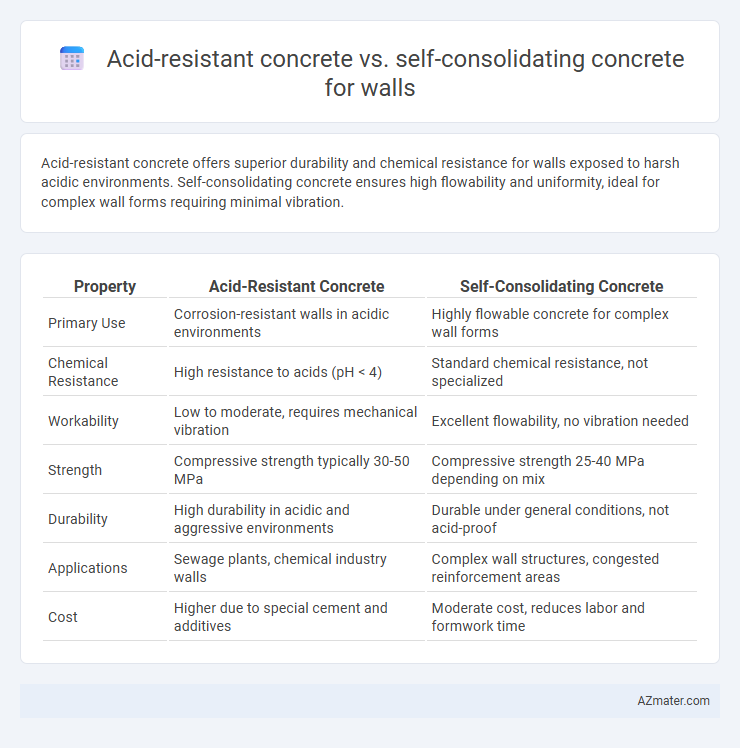Acid-resistant concrete offers superior durability and chemical resistance for walls exposed to harsh acidic environments. Self-consolidating concrete ensures high flowability and uniformity, ideal for complex wall forms requiring minimal vibration.
Table of Comparison
| Property | Acid-Resistant Concrete | Self-Consolidating Concrete |
|---|---|---|
| Primary Use | Corrosion-resistant walls in acidic environments | Highly flowable concrete for complex wall forms |
| Chemical Resistance | High resistance to acids (pH < 4) | Standard chemical resistance, not specialized |
| Workability | Low to moderate, requires mechanical vibration | Excellent flowability, no vibration needed |
| Strength | Compressive strength typically 30-50 MPa | Compressive strength 25-40 MPa depending on mix |
| Durability | High durability in acidic and aggressive environments | Durable under general conditions, not acid-proof |
| Applications | Sewage plants, chemical industry walls | Complex wall structures, congested reinforcement areas |
| Cost | Higher due to special cement and additives | Moderate cost, reduces labor and formwork time |
Introduction to Specialty Concrete for Walls
Acid-resistant concrete offers enhanced durability and chemical protection for walls exposed to harsh acidic environments, utilizing specialized cementitious materials and additives to prevent corrosion and deterioration. Self-consolidating concrete (SCC) provides superior flowability and consolidation without mechanical vibration, enabling efficient placement in complex wall forms and tight reinforcement areas while ensuring uniform density and surface finish. Both specialty concretes address specific structural and environmental demands, optimizing wall performance in industrial, commercial, and infrastructure applications.
Understanding Acid-Resistant Concrete
Acid-resistant concrete for walls is specifically formulated to withstand harsh chemical environments, utilizing acid-resistant aggregates and special cement blends to prevent degradation and maintain structural integrity. Its dense microstructure and low permeability prevent acid infiltration, making it ideal for industrial facilities exposed to corrosive substances. Unlike self-consolidating concrete, which prioritizes flowability and ease of placement, acid-resistant concrete emphasizes durability and chemical resistance for long-term protection of wall surfaces.
Overview of Self-Consolidating Concrete
Self-consolidating concrete (SCC) is a high-performance material designed to flow easily into complex formwork while maintaining uniformity and preventing segregation without mechanical vibration. It offers superior workability and excellent surface finish, ideal for constructing walls with intricate shapes or dense reinforcement. Compared to acid-resistant concrete, SCC prioritizes ease of placement and structural integrity rather than chemical resistance.
Chemical Resistance Requirements for Wall Structures
Acid-resistant concrete is specifically engineered with high-density aggregates and chemical-resistant binders to withstand harsh acidic environments, making it ideal for wall structures exposed to aggressive chemicals such as sulfuric or hydrochloric acid. Self-consolidating concrete (SCC) offers superior flowability and homogeneity, ensuring dense, void-free walls but may require additional chemical-resistant additives or coatings to meet stringent acid resistance standards. For chemical resistance in wall structures, selecting acid-resistant concrete provides enhanced durability against corrosive agents, whereas SCC optimizes placement and structural integrity but demands tailored formulations to achieve comparable chemical resistance.
Workability and Placement Efficiency
Acid-resistant concrete offers enhanced durability in chemically aggressive environments but often requires careful handling due to its denser mix, impacting workability. Self-consolidating concrete (SCC) exhibits superior flowability and stability, allowing for effortless placement without mechanical vibration, enhancing efficiency in wall applications. The high fluidity of SCC ensures uniform filling of complex forms and reduces labor time, contrasting with the more challenging placement of acid-resistant concrete.
Durability and Longevity of Concrete Walls
Acid-resistant concrete features specialized chemical compositions that enhance resistance to aggressive acidic environments, making it ideal for industrial walls exposed to chemical corrosion, thereby significantly extending wall durability. Self-consolidating concrete, designed for optimal flowability without compromising strength, ensures dense, void-free walls that reduce permeability and enhance structural longevity in standard environmental conditions. Selecting acid-resistant concrete improves lifespan in corrosive settings, while self-consolidating concrete offers superior durability in complex formwork and densely reinforced wall applications.
Comparative Cost Analysis
Acid-resistant concrete typically incurs higher material costs due to specialized additives like silica fume and polypropylene fibers designed to enhance chemical durability. Self-consolidating concrete (SCC) costs are influenced by advanced admixtures that improve flowability and reduce labor expenses by eliminating the need for vibration during placement. When comparing overall expenses, acid-resistant concrete presents higher initial investment for corrosion protection, whereas SCC offers cost savings in labor and construction time, making the choice dependent on project-specific durability requirements and budget constraints.
Performance Under Aggressive Environments
Acid-resistant concrete offers superior durability in highly corrosive environments due to its specialized chemical composition that withstands acidic attacks, making it ideal for walls exposed to aggressive industrial chemicals. Self-consolidating concrete excels in creating dense, homogenous walls with excellent impermeability and minimal voids, enhancing resistance to environmental stressors but with moderate chemical resistance compared to acid-resistant types. For walls subjected to harsh acidic conditions, acid-resistant concrete provides enhanced longevity and protection, while self-consolidating concrete is preferred for structural integrity and ease of placement in complex formworks.
Maintenance and Lifecycle Considerations
Acid-resistant concrete offers superior durability in chemically aggressive environments, reducing maintenance frequency and extending lifecycle by preventing surface degradation and corrosion. Self-consolidating concrete provides excellent workability and uniformity, minimizing honeycombing and defects that can lead to long-term maintenance issues in wall structures. Selecting acid-resistant concrete enhances longevity in harsh settings, while self-consolidating concrete optimizes initial quality, influencing maintenance needs and lifecycle performance.
Selecting the Right Concrete for Wall Applications
Acid-resistant concrete offers superior chemical durability, making it ideal for walls exposed to highly corrosive environments such as industrial facilities and wastewater treatment plants. Self-consolidating concrete (SCC) enhances structural integrity and surface finish by eliminating the need for vibration, ensuring uniformity in complex wall forms and densely reinforced structures. Selecting the right concrete involves evaluating exposure conditions; acid-resistant concrete for corrosive resistance, and SCC for ease of placement and improved aesthetics in wall applications.

Infographic: Acid-resistant concrete vs Self-consolidating concrete for Wall
 azmater.com
azmater.com